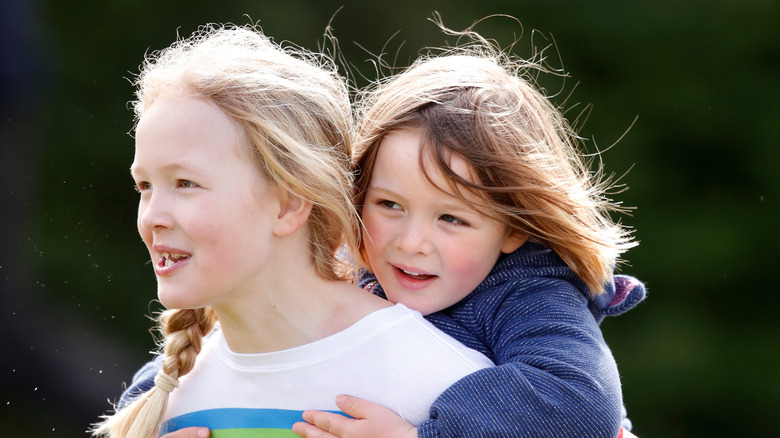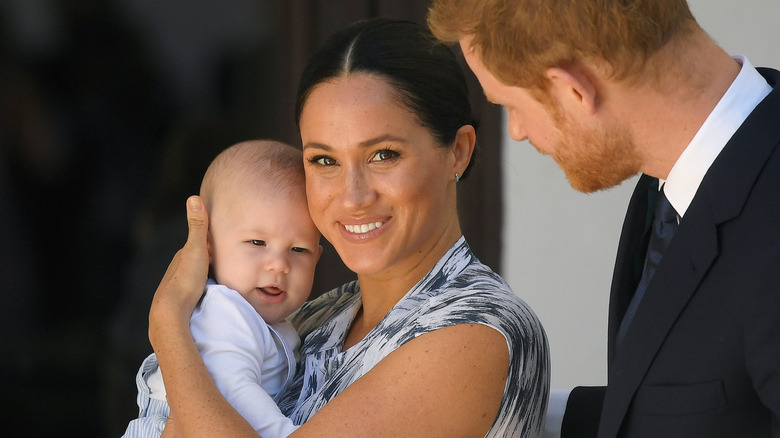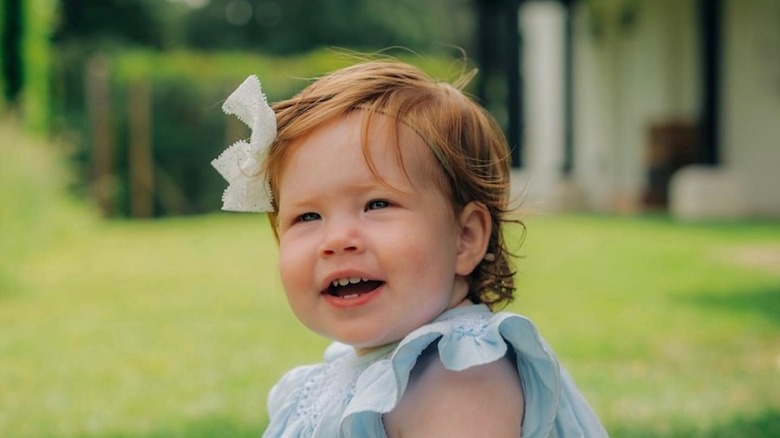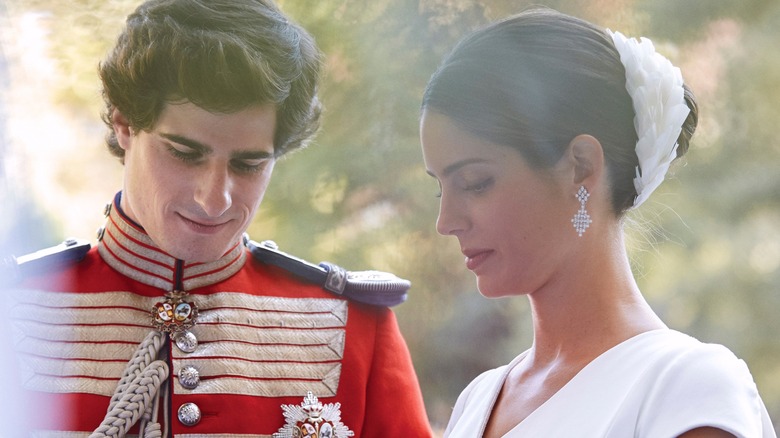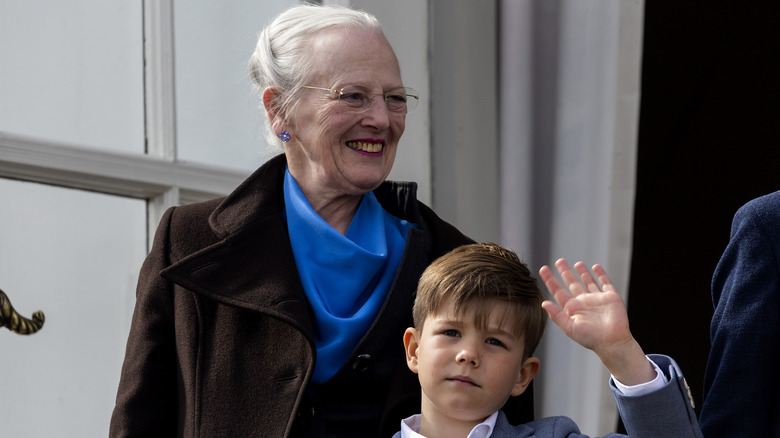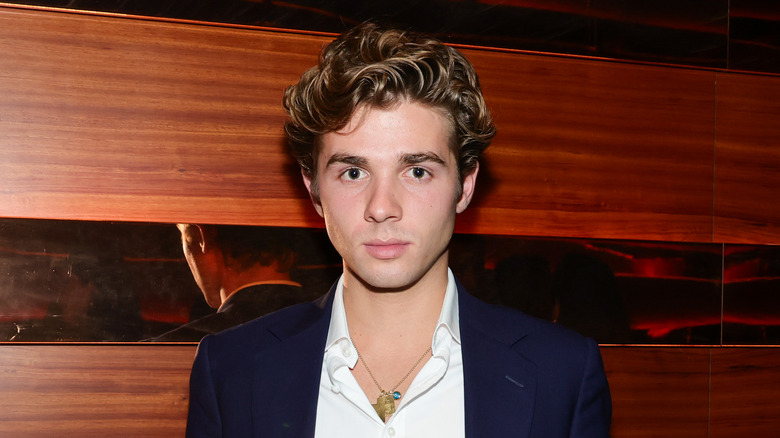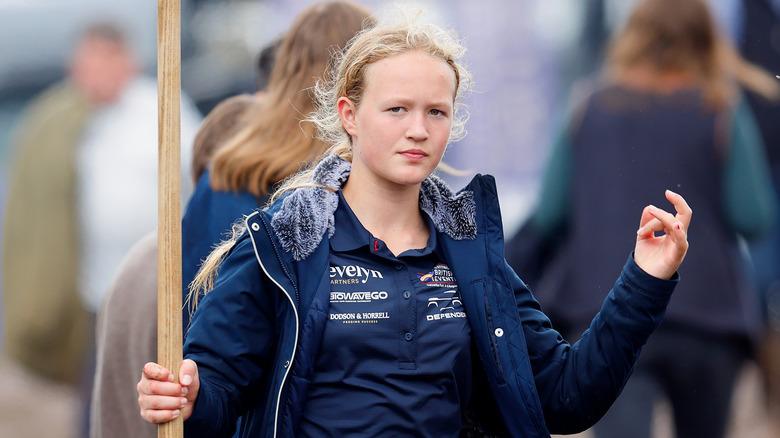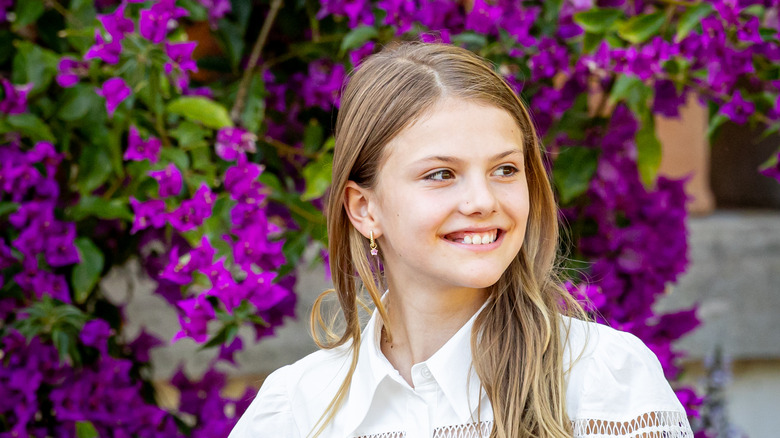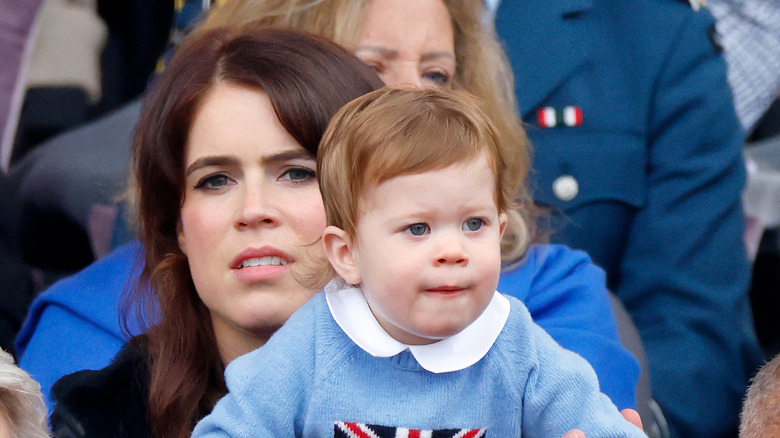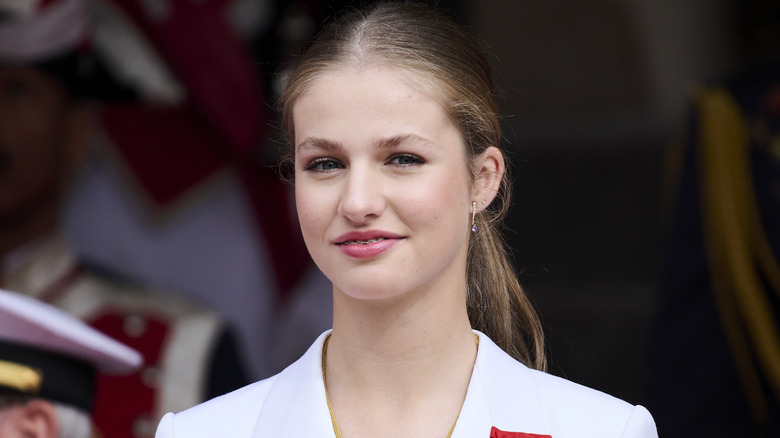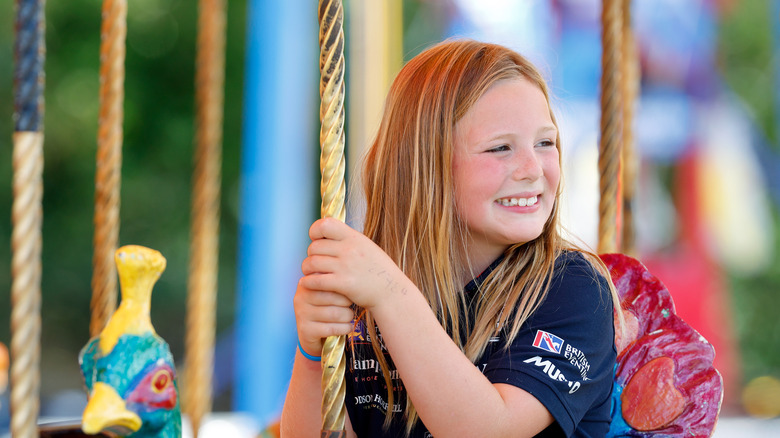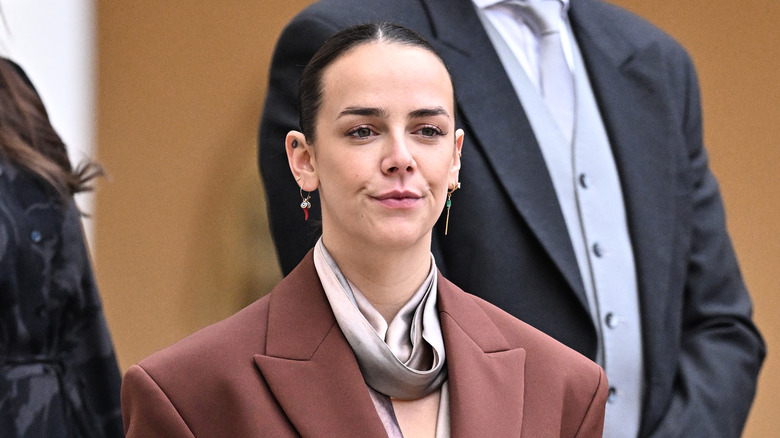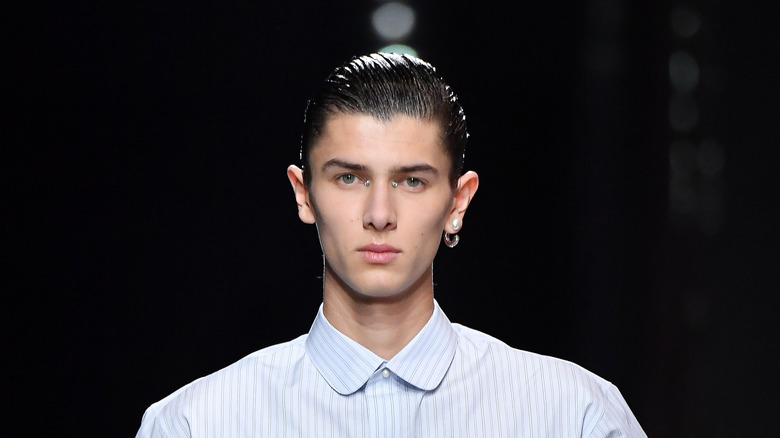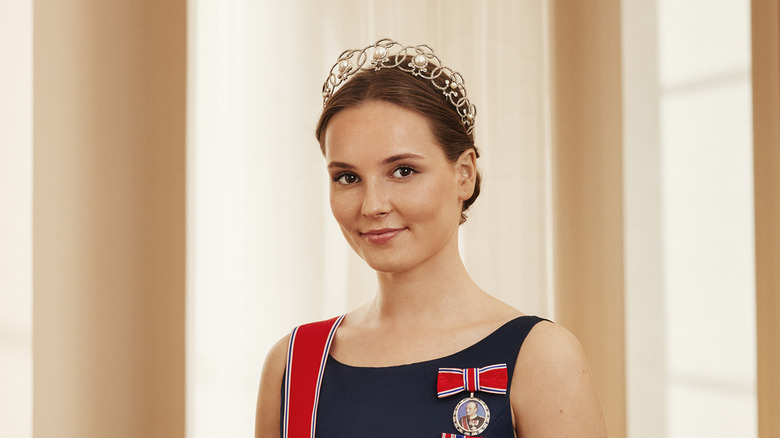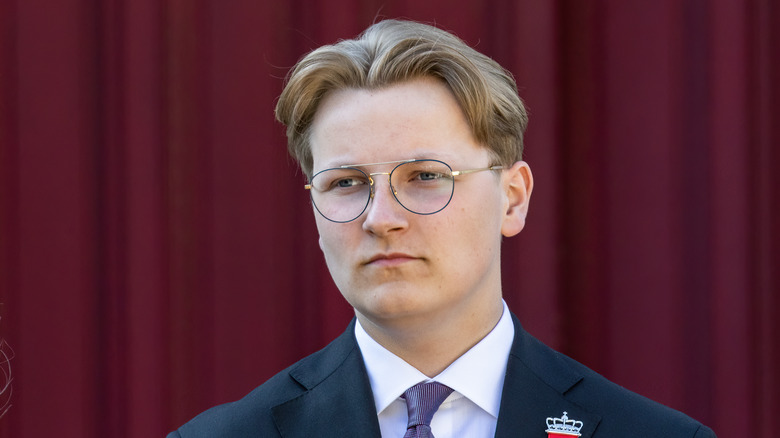Royal Baby Names That Were Completely Unexpected
What's in a name? Lots, especially when one is a royal. Standing out as the most definitive detail of their noble identity, the name is often what marks a royal baby's foremost appeal among the public. It's why many royal families across the world traditionally delay announcements pertaining to the names of new members.
As royal commentator Victoria Arbiter told Town & Country magazine, "They want to be a hundred percent certain of their choice before announcing the name and sealing the baby's place in history." (The pressure is real.) Moreover, given the exclusivity royal families maintain, it is almost inconceivable that a public declaration would be made without the parents first going through the process of informing their kin.
There are certain names the world has come to associate with royalty — think Elizabeth, Louis, or Charles. It can be understood as a result of the conventional royal practice of naming members after their ancestors or other historical figures. "You want a name that resonates, a name that's got family links and is popular," royal expert Richard Fitzwilliams told the BBC. With the modernization of monarchical structures, however, royals over the past few decades have noticeably taken greater freedoms with naming their children. The consequence is a new-age cohort of royals, each more creatively named than the last. Take a look at the royal baby names that were completely unexpected and what they mean.
Archie Harrison Mountbatten-Windsor
Come to think of it, Archie Harrison Mountbatten-Windsor was the harbinger of significant change in the British royal family. Not long after he was born in 2019, his parents Prince Harry and Meghan Markle decided to exit the royal family, marking a radical breakaway that altered the course of Britain's monarchy.
His name itself — a shortened version of Archibald, which means "bold or brave" — is reflective of his parents' defiance. It is also irrevocably tied to their humanitarian ventures with the Archewell Foundation, which the couple said was an early inspiration for their son's name. Though Archie was born in Britain, he is growing up in the United States, where his forename wasn't particularly popular — until his arrival, that is!
Highlighting Harry and Meghan's agency in naming their child, Cleveland Evans of the American Name Society told Time: "They probably want to modernize it and want the royal family to be seen as regular people, which is why they'd choose a name like Archie, which at the moment is a regular, everyday British boy's name." Harrison, meanwhile, fittingly alludes to the son of Harry. Archie's last name is the only major part of his title that acknowledges his lineage, used in the event of his lack of a royal title. It can be read as a dedication to Harry's grandfather Prince Philip, who "was never allowed to call his children by his own surname," royal author Penny Junor told the BBC.
Lilibet Diana Mountbatten-Windsor
Consistent with their convention-bending track record, Prince Harry and Meghan Markle gave their daughter a most unusual name: Lilibet Diana Mountbatten-Windsor. Lilibet holds biblical connotations, drawing from the Hebrew name Elisheba, meaning "God is my oath."
The special significance of the young royal's name, however, does not come from that meaning alone. Lilibet was actually a nickname for her great-grandmother Queen Elizabeth II, who died just a year after Harry's daughter was born in 2021. Per The Guardian, the moniker came from a young Elizabeth attempting to say her own name, ending up instead with a sweet variation that stuck for life.
Decoding the royal's second name is far easier and more emotional. Diana is a dedication to Harry's mother Princess Diana, who tragically died in a car crash back in 1997. Like all of Britain, Harry adored Diana, and her impact on his life — as well as his marriage to Meghan — transcended her death. Beyond their sentimental value, the names can also be perceived in the context of Harry and Meghan's strained relationship with some senior royals in the family. "I think that a lot of people are saying, quite rightly, that this is a form of olive branch to the royal family," historian Andrew Roberts told NBC News.
Sofía Fernanda Dolores
The world isn't ready for this Spanish royal's name! Fernando Fitz-James Stuart, who holds the title of the Duke of Huéscar, welcomed a baby girl with his wife Sofía Palazuelo in 2023 and seemingly didn't hold back when it came to naming her. At 25 words, hers would easily rank among the longest names in the world: Sofía Fernanda Dolores Cayetana Teresa Ángela de la Cruz Micaela del Santísimo Sacramento del Perpetuo Socorro de la Santísima Trinidad y de Todos Los Santos. Quite a mouthful! But before Sofía could get around to mugging up her serpentine title — which comprises ancestral and religious dedications, according to El País — it hit a snag.
Spanish law states that "no more than one compound name may be recorded, nor more than two simple ones" in legal registrations. Sofía's moniker perceptibly crossed this threshold, prompting the duke to reconsider her elaborate name that was inspired by an ancestor's.
Sofía's great-grandmother Cayetana Fitz-James Stuart once held the honor of being the most titled person in the world recognized by the Guinness World Records, with her full name extending up to 57 words. While the rest of her title came as a shocker, the Greek-origin forename Sofía — which means "wisdom" — was hardly surprising, given the all-pervasive popularity of the name in both royal and non-royal settings.
Vincent Frederik Minik Alexander
The Danish prince Vincent Frederik Minik Alexander is profoundly tied to historic traditions by his forename, which has long been associated with saints and artists (the most famous one bearing the last name van Gogh). Given its traditional affiliations, the name Vincent boasts massive significance in Christianity and implies exalted concepts of victory and triumph. According to the Department of Nordic Studies and Linguistics at the University of Copenhagen, the name's Danish links go as far back as the 12th century, foreshadowing the popularity it would enjoy in the centuries to come.
More than Vincent, however, one of the middle names of the young Count of Monpezat is what stands out in his title most vividly. Nameberry defines Minik as the "oil used to seal skins," while its more profound connotations link it to the tragic story of a 19th-century Inuk boy from Greenland.
Minik, as he was named, was taken to the United States for anthropological research and orphaned there, going on to become a historical symbol of supremacist exploitation of Indigenous populations. Minik holds distinct meanings in the Greenlandic context that the royal's parents Crown Prince Frederik and Crown Princess Mary sought to honor with his name, Now To Love reported. The young prince has a twin sister named Josephine Sophia Ivalo Mathilda.
Achileas-Andreas Glücksburg
Historically and mythologically endowed, Greece has a wealth of references to draw from — an advantage that was evidently utilized while naming Prince Achileas-Andreas of Greece and Denmark. His thoroughly Greek, hyphenated title honors his country's grand ancient traditions rather ornately. Achileas is a variation of the name Achilles, which most famously belongs to the great Trojan hero from Homer's "Iliad." Though its etymological meaning derived from the word "achos" relates to pain, the moniker Achilles instantly conjures up associations to a warrior.
Similar ideas of strength are reiterated through the second part of the prince's forename Andreas, which is a Greek title with grandiloquent meanings of masculinity.
The prince's name exudes royal magnificence but, given that he doesn't indulge in his family's now-defunct royal power, he apparently prefers going by the casual shorthand Achi that better suits his commoner lifestyle. Born in the United States, where he also completed college, Achileas took the showbiz route and made his acting debut on the soap opera "The Bold and the Beautiful." He told Paper, "When I was a kid I remember always watching movies and TV shows and I was like, This is what I want to do: be an actor."
Savannah Phillips
Out of the younger crop of colorfully named British royals, Princess Anne's granddaughter Savannah Phillips bears one of the most unique titles. Her name carries the uncomplicated meaning of "savanna" as we know it, referencing grasslands typically found across Africa and South America. This Spanish-origin name has been favored for centuries, its popularity only soaring in the late 20th century. Quite like the untamed denotations of her name, Savannah has the reputation of being a royal renegade worth looking out for.
Royal expert Judi James described her as the leader of "an exclusive but competitive set of runners when it comes to winning the title of the most rebellious young royal," per Express. Her prominence in the midst of her more influential Wales cousins is noteworthy and, as the oldest of Queen Elizabeth's great-grandchildren, she manages to balance her goofy and caring sides in equal measure, James observed.
Also part of this exclusive royal club is Isla Phillip, whose name is as geographically exotic as her sister Savannah's. (It's only understandable, given that their mother's name is Autumn.) Like Savannah, Isla is rooted in the Spanish language and means "island."
Estelle Silvia Ewa Mary
Estelle Silvia Ewa Mary was the first baby born to the Swedish royal family in three decades. So naturally, the milestone moment deserved to be marked distinctly. The princess' name did the job well enough, standing out as a rarity not often encountered in royal circles across Europe.
Estelle essentially draws from the French name Stella, which means "star." Though it is used in various capacities among the general public in Nordic countries, the name Estelle was not typically associated with royalty before the birth of Crown Princess Victoria's daughter.
The heiress' reason for changing this tradition in 2012 supposedly held deep sentiment. "It is a name which is very close to the heart of the princess and also the family," her father King Carl Gustaf said, according to Reuters. Reports linked the princess' forename to the wife of 20th-century aristocrat Count Folke Bernadotte, who was also called Estelle, CBS News reported. Remembered for his role in saving thousands of Jewish lives during World War II, the count held close ties to the royal family as King Carl's godfather. Other titles in the princess' name are dedications to her maternal and paternal grandmothers.
August Philip Hawke Brooksbank
When Princess Eugenie announced the name of her firstborn, it seemed like the continuation of an avant-garde tradition popular among the younger generation of British royals. August Philip Hawke Brooksbank, born in 2021, bore a name that was relatively unheard of around the halls of Buckingham Palace. But then again, not really. It was quickly made clear — through Eugenie's own explanations on Instagram, Harper's Bazaar reported — that the little boy's name carried some serious royal mileage.
August is a shortened dedication to Prince Albert of Saxe-Coburg and Gotha, who was Queen Victoria's husband and notably had the middle name Augustus. The name itself is associated with grand meanings like "venerable" and, of course, the eighth month on the calendar. Eugenie's grandfather Prince Philip also found a glowing special mention in the baby's name. As interpreted by royal expert Katie Nicholl, Eugenie and her husband Jack Brooksbank had agency in picking out a name for their son, whom they don't intend on raising with a royal title, per Entertainment Tonight.
A similar approach was followed when Eugenie's second son came along, named Ernest George Ronnie Brooksbank for several of his ancestors. The princess' own first name links her to Victoria Eugenie of Battenberg, the Queen of Spain in the 20th century. According to the Los Angeles Times, the name Eugenie took Britain by surprise and got mixed reactions when the princess was christened in 1990. A bunch of trendsetters, we'd say.
Princess Leonor of Asturias
Leonor de Todos los Santos de Borbón y Ortiz, or Princess Leonor of Asturias, as she is commonly known, is a true queen in the making. Her name — which is a variation of the popular Swiss name Eleanor and holds positive connotations to light — is an appropriate reflection of the beaming popularity she enjoys in her home country of Spain.
In fact, the heiress to the Spanish throne is reckoned to be the most admired member of the Spanish royal family, her appeal even outweighing that of her father King Felipe VI. Her name has reportedly inspired a phenomenal fan following of sorts, collectively referred to as "Leonormania" in the press.
"The image that Leonor gives is that of being where she needs to be," journalist Fernando Rayón told Euronews, citing her yet limited public interaction as a reason for the sudden surge in people's fascination with her. During her teen years, Leonor was off accomplishing other non-aristocratic ventures, including a training stint at the General Military Academy of Zaragoza. Interestingly, she did not go by her given name at the academy, per People. Instead of Leonor, her name tag identified her as Borbón Ortiz — a dedication to her lineal House of Bourbon and a maternal family name.
Mia Tindall
Britain and bookmakers were taken by surprise when the newest member of the royal family in 2014 was christened Mia Grace Tindall. A name rooted in various global cultures — all the way from Egypt to Italy — it holds connotations to "one who is loved." Given its universal appeal, the name Mia really hasn't gone out of style ever since its popularity first accelerated during the 1990s. Among the multitude of people enamored by this short and sweet name were royal couple Zara and Mike Tindall, who prioritized a personal preference over conventional standards of royal baby names, selecting the name Mia for their firstborn out of a sea of Marys and Victorias.
People reported that the name Mia was so unexpected that it didn't show up on name-betting lists in Britain, which generally have a finger on the pulse of royal inclinations. But considering that Zara's own name was a royal anomaly, was it really so surprising that she continued the tradition with her daughter? In fact, the Olympic-level equestrian took it up a notch with her second daughter, naming her Lena Elizabeth Tindall.
While the tribute to Zara's aunt, the late Queen Elizabeth II, is evident, the baby's forename was simply a result of free choice. "It is just a name they liked," a spokesperson for the couple said (via Town & Country). Lena is a name of Greek origin meaning "light."
Pauline Ducruet
Pauline Ducruet's name is as rare among Monégasque royalty as are her endeavors. She was born in 1994 to Princess Stéphanie of Monaco, the daughter of Hollywood legend-cum-princess Grace Kelly. A title not too common among the blue-blooded clan in Monaco but popular in neighboring France, "Pauline" draws from Latin origins and — inconsistent with her towering achievements — means "small." Pauline, who is 17th in the line of succession, grew up to shelve her royal stature, busying herself instead with an off-center career that covers the breadth of Youth Olympic diving to contemporary fashion.
"I wanted to wear leotards with sparkles," she told The Telegraph. Raised in a liberal environment beyond palace halls — including in and around a circus — Pauline credited her vibrant life to the convention-breaking adult she became. "It builds up your character and experiencing all those things makes you a stronger person," she said.
Her business Alter, a promoter of gender-fluid style, is one of the foremost feats on her resume. It's no surprise, given her fashionable lineage made up of established divas the likes of her mother and grandmother. When it came to naming her own baby — her brand — Pauline was as creative as her parents were in christening her. She explained to The Daily Front Row that she wanted her brand "to be pronounceable in French and English, and it means the same in the two languages."
Count Nikolai of Monpezat
Not long after he came into the world, Nikolai William Alexander Frederik became a trendsetter. His name was a novelty in the Danish royal family, a sharp contrast to the time-honored titles of "Frederik" and "Christian," predetermined for Denmark's monarchs. It is a variant of the Greek-origin name Nicholas, which means "victory of the people." Interestingly, the Danish variation of the name is Nikolaj, while Nikolai is favored in Slavic regions like Russia. Around the time that the Danish royal was born in 1999, the name Nikolai enjoyed massive popularity that crossed over into the new millennium (via The Bump).
The oldest grandchild of Queen Margrethe II, Count Nikolai of Monpezat was among Prince Joachim's four children to be stripped of their royal titles in 2023. While the decision was made in a bid to allow greater autonomy to royal descendants like Nikolai — who is an established model, with industry bigwigs like Burberry and Dior on his roster — the runway star did not welcome it without question.
"I am very confused as to why it has to happen like this," he told the local press, according to The Independent. Besides his modeling career, Nikolai also pursued academic undertakings in business, for which he moved to Australia.
Ingrid Alexandra
Upon her birth in 2004, Princess Ingrid Alexandra was blessed with a name fitting for a queen. After all, as the first daughter of heir apparent Crown Prince Haakon, her destiny dictated that she would grow up to become Norway's first female monarch in over six centuries.
The name Ingrid draws from Norse origins and alludes to the beauty of Ing, the god of fertility. The name has enjoyed somewhat consistent popularity around Scandinavian countries like Norway for decades, though its cross-continental appeal shot up significantly in the mid-20th century with the growing fame of the most famous modern bearer of the name, Hollywood icon Ingrid Bergman.
The Norwegian princess was christened in a headline-making ceremony at the Royal Palace in Oslo. The name Ingrid was received favorably after it was announced as the name of Norway's future queen, local press Nettavisen reported. "It was a very beautiful and dignified royal name," Ingrid's aunt Princess Märtha Louise said, while a general survey showed that 77% of people were appreciative of the title. As she turned 18, her presence and prominence at official engagements increased, though the environmentally-conscious princess' foremost focus in the near future will be academics, according to The Royal House of Norway.
Sverre Magnus
Prince Sverre Magnus may be years away from taking the Norwegian throne, but his life is already tied to the legacy of a royal predecessor with whom he shares a name. Sverre Sigurdsson, or Sverre of Norway as he is known in the pages of history, was a 12th-century king who made a significant impact on medieval politics as they related to changing the power dynamic between Norwegian royalty and the church. His title — which evolved from the Old Norse name Sverrir and meant "wild" — was illustrative of his roaring ways.
The name does enjoy wide favor in Norway and around other Scandinavian parts, though the only famous royal in centuries after Sverre of Norway is Crown Prince Haakon's son. Much like his sister Princess Ingrid Alexandra, Sverre was christened with a name not the most usual for a member of the royal family. Then again, Sverre is anything but a regular royal.
His earliest claim to fame at age 11 was when he went rogue during formal royal celebrations and, in breach of all things princely, performed the dab gesture in full view of the public from the balcony of Oslo's Royal Palace. As Mashable noted, the young prince's playful antics struck a chord online and made him an instant internet favorite.
